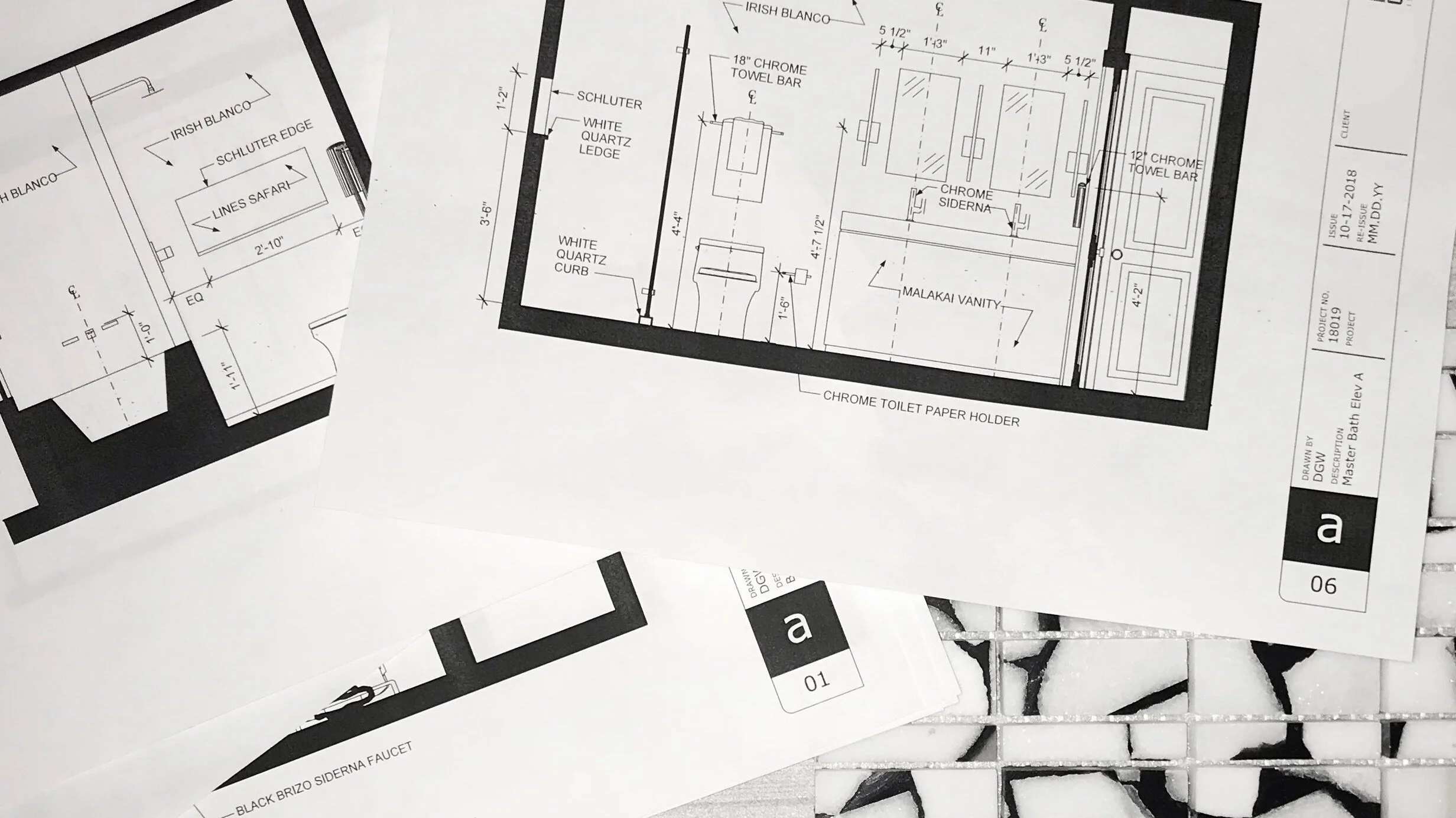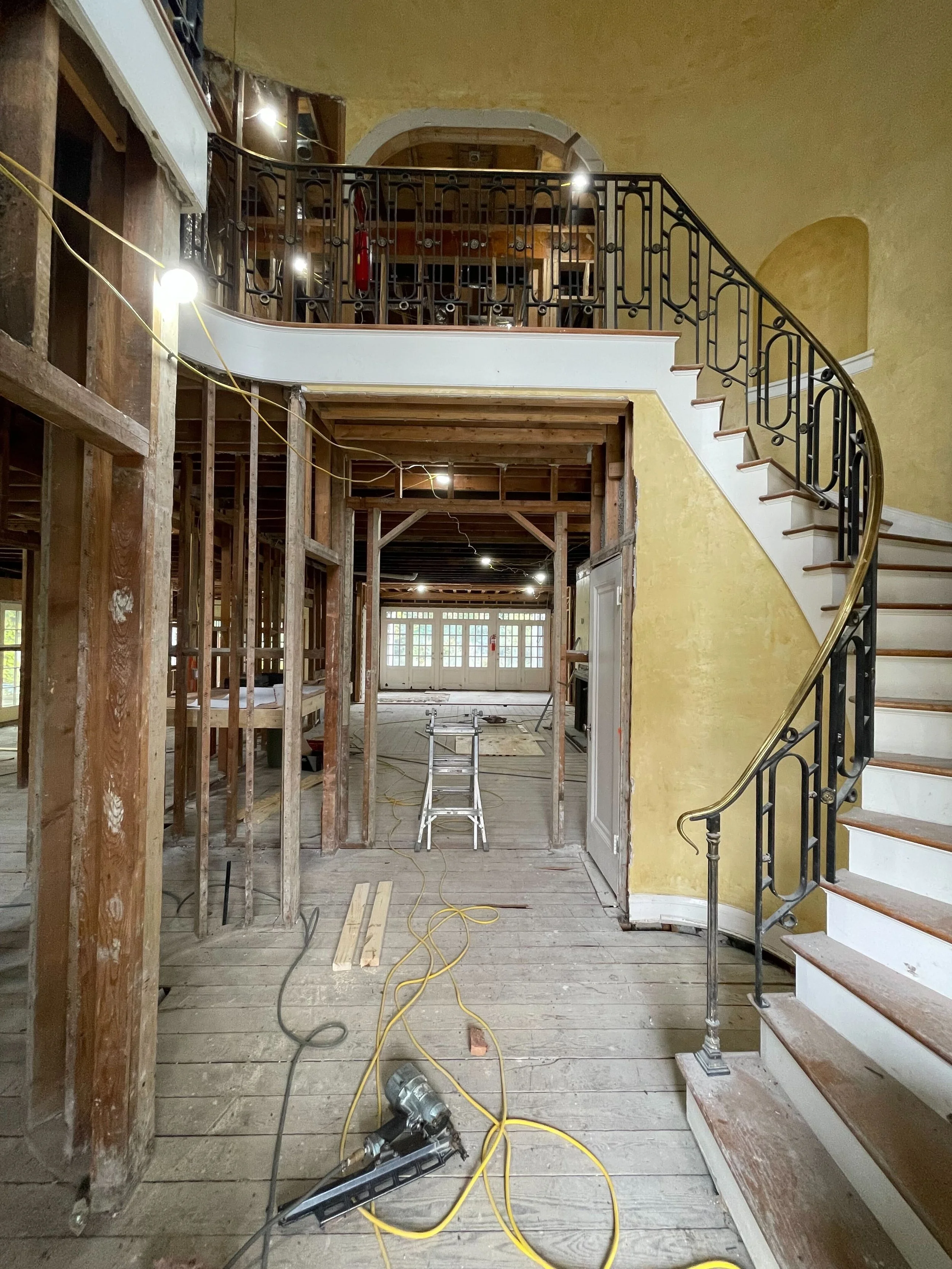Things I Wish Everyone Knew Before Renovating
A question we get asked a lot is: What should I know before I start renovating my home? My answer: How much time do you have?
Today, I'm taking the time to break out my best advice to prepare for a renovation. A renovation is a stressful, expensive and long process...there will be tears at one point, I guarantee it. But the end result of having an updated, functional home for you and your family to grow and live in, while also increasing the value of your home, is worth it…right?
Plan ahead - but also be flexible
I cannot stress how important it is to make a plan before you start renovating. If you hire an interior designer or architect, they should be the ones creating the plan for you (and if they're not, call us) but you should be completely aware of what it is and be prepared for it. At the same time, be prepared for things to change. As soon as walls are opened up, hidden mysteries often tend to show their ugly faces, and sometimes plans need to pivot to work around these things. Ok, let's get more direct:
Create a budget for the project. Don't just throw a number out there and say that's what you want....do some research, or again, ask a professional to determine the real costs of what you want to do. We typically ask clients to create their full wish list, and then we break out a budget for everything on it. From there, if we need to reprioritize anything, we can do so together now that we have all the information. Keep in mind, during the renovation, some unexpected costs may occur - there may be something uncovered inside the walls that needs to be addressed, or you may learn that you need to add a second circuit breaker to accommodate your new plans. Leave some buffer room for these expenses so that you don't get caught in a tough position in the middle of construction, when stress levels are already elevated.
Determine what your living situation is going to be during the renovation. Depending on the size of the project, it's going to be quite disruptive to your daily life. Crews will be coming into the house early in the morning to get started. Water and electricity will be shut off at times. Drywall dust will be EVERYWHERE. It will be loud. Not to mention, it's also incredibly stressful to watch a renovation happen live...kind of like watching sausage get made. If you are able, plan ahead to live elsewhere during your renovation. It will help you in the long run to make sure you are comfortable for the months that construction is happening and whatever the extra cost is will be well worth it for your sanity.
Order materials. Lead times these days are not what they used to be. Some appliances can take a year to come in. Wood and tile can be just as unpredictable at times. Plan your design ahead of time (or again, *cough* hire a professional to do it) and get the materials ordered before you start. That way, by the time the contractor needs them, they're already in. This helps the trades work quickly and efficiently and minimizes downtime.
2. Hire the right team
Assuming you aren’t going to DIY your project, there are a lot of parties that need to be involved. For a renovation, you’ll want to hire an interior designer, an architect if you need permits, and a general contractor. These teams are going to be working closely together, so it’s important that they understand one another’s process and responsibilities.
Our recommendation, surprise surprise, is to hire your interior designer first. The designer is going to be the one essentially creating the scope of work, and they’ll be able to determine if an architect is needed for permits, and will help mediate the bid process for a general contractor. A lot of design firms also have trusted vendors and trades that they work with regularly and can help navigate the process as smoothly as possible.
Get bids from multiple General Contractors. The biggest mistake we see people make when starting a build or a renovation is they commit to a builder (or more importantly, the bid itself) before developing the design. Builders really can’t predict the exact cost of a project until they know exactly what is being done, and rightly so. They don’t know if you are going to want marble countertops or porcelain…or what level of cabinetry you’re going to want, or if you want prefinished hardwood floors or stained on site floors. We always recommend hiring an interior designer and architect first, developing the design, and then getting bids from contractors. Once you have multiple bids, you can compare and contrast to ensure you have the perfect fit. Pro tip – never take the lowest bid.
3. Trust Your Team And The Process
I think this is the hardest part for people to accept sometimes. So many people are used to having full control over everything going on in their lives, but with construction projects, you really need to accept that things will never go 100% to plan, and trust that you’ve hired the right people to handle it for you. If you don’t have trust in the team you’ve hired, you’re going to have a rough few months ahead.
The thing that I think is toughest to understand (and I get it, I struggle with this at times too) is that construction is a sequential process. Things need to get batched and done in a certain order which sometimes results in the space being empty for partial days, or sometimes even days at a time. It’s best to digest it by thinking of it in terms of the trades working on the process. In order for a plumber and electrician to do their work, walls need to be framed. So the carpenter will frame the space first, and leave the walls open. Once framing is done, the plumbers, electricians and HVAC groups will come in to do all of their rough work. (Rough work means essentially installing all of the “guts” of the house that will go inside the wall. Running conduit for electrical, ducts for HVAC, pipes for plumbing, etc.) This takes a decent chunk of time and is honestly the least satisfying to watch because to the untrained eye, it will look like nothing is changing for a few weeks or months…but in reality, this is arguably the most important part of the process. This is the time to check locations of everything because after this, comes insulation and drywall, and then it’s a much bigger ordeal to make changes. Once drywall is done, it transitions into finishing details. Flooring, tile, paint, trim, cabinets, all of those fun things you’ve been waiting for get to start going in. But wait…they can’t all go in at the same time. First the flooring installer will go in to do his work. Sometimes the tiler can work at the same time, but not always. Then the cabinetry gets installed which can take weeks depending on the process. Not until cabinets are in, can countertops be measured for. Once they are, then the clock starts on countertop fabrication…which can sometimes be a few weeks. Cue the waiting. Hopefully painting or trim work can be happening while you wait, but not always. Once countertops are in, then appliances, plumbing trims and light fixtures can be installed…which means those trades that were in your house roughing in before drywall went up, come back to finish the job.
All of the above doesn’t even take into consideration renovations that require a permit. If you’re lucky, all you need is a “pull and replace” permit, which will not require inspections. But if you are planning to move walls, relocate plumbing or make any major structural changes…be prepared for the inspection process. There are multiple inspections throughout the lifetime of a project, and unfortunately, there is little you can do to control the timing or speed of them. Just another part of the renovation process that you need to make peace with prior to beginning.
All of this is not meant to be overwhelming. Yes, a renovation can be a stressful thing to go through, but it’s also a wonderful thing to experience, and a luxury that not everyone gets to partake in. Renovating your home increases it’s value and ensures that you have a space that is functional, efficient and enhances your life. By taking these notes into account, you should be fully prepared for as smooth a process as possible. Enjoy your finished product and just be sure to schedule in a few massages or weekend getaways during the renovation to keep you sane.
Are you ready to start your renovation project? Fill out our project inquiry form to get in touch.
-dgw




